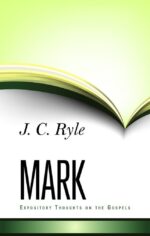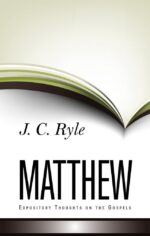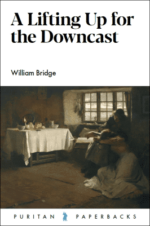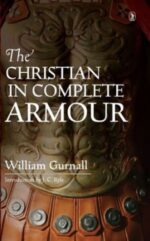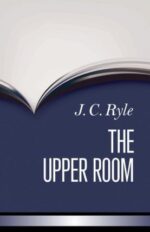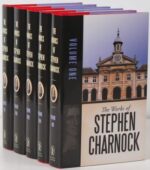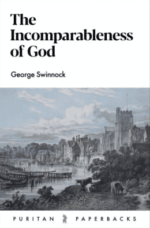-
Expository Thoughts on the Gospels: Mark (J. C. Ryle)
$25.00First published in 1857, Mark was the second book to appear in J. C. Ryle’s series of Expository Thoughts on the Gospels.
-
Expository Thoughts on the Gospels: Matthew (J. C. Ryle)
$25.00As the first Gospel in the New Testament, Matthew was, not surprisingly, the first to be published in J. C. Ryle’s series of Expository Thoughts on the Gospels (1856). Ryle’s expositions are a rich combination of doctrinal and practical comments on the Gospel text.
-
Expository Thoughts on the Gospels: Luke Vol. 1 (J. C. Ryle)
$25.00Ryle’s commentary on Luke was was a much more ‘substantial’ commentary than the earlier ones on Matthew and Mark, and comprehensive ‘explanatory notes’ were appended to the author’s ‘thoughts’ on each passage of Scripture. The purpose of the notes was four-fold:
1st, to ‘throw light on difficulties’ in the text
2nd, to provide literal meanings and comparative translations of certain of the Greek words used by Luke.
3rd, to quote what other ‘approved writers’ had said on particular passages.
4th, to use Scripture to ‘combat existing false doctrines and heresies’. Because of this, the Expository Thoughts on Luke were – and are in this new edition – presented in two volumes, the first covering Luke chapters 1-10, the second chapters 11-24. -
The Works of John Newton (4 volumes)
$99.99Newton has a firm place in the classics of Christian literature. While his style is strong and clear, it is the spiritual attractiveness and importance of his main themes which secure the permanent value of his writings. Most of his books came, unpremeditated, out of a need to help his congregation or individual hearers, and it is in practical helpfulness towards Christian living that he excels.
$150.00 -
J. C. Ryle: Prepared to Stand Alone (Iain Murray)
$16.50From a new wealth of material, Iain Murray has put together a compelling biography. Ryle believed in a gospel message which does not adjust to the times, in revival, and in the living Christ. He knew that all the great turning points of church history have been attended with controversy, and that ‘there are times when controversy is not only a duty but a benefit’.
J.C. Ryle’s life is convincing evidence that Christianity stands or falls depending on its relation to the word of God and to the Holy Spirit. That he is being read widely again at the present time gives hope of better days.
$18.00 -
A Lifting Up for the Downcast (William Bridge) (#1)
$9.75These thirteen sermons on Psalm 42:11, preached at Stepney, London, in the year 1648 are the work of a true physician of souls. In dealing with believers suffering from spiritual depression, Bridge manifests great insight into the causes of the saints’ discouragements such as great sins, weak grace, failure in duties, want of assurance, temptation, desertion and affliction.
A correct diagnosis is more than half the cure, but Bridge does not leave his readers there. He gives directions for applying the remedy. For example, in dealing with ‘great sins’ he says: “If you would be truly humbled and not be discouraged; not be discouraged and yet be humbled; then beat and drive up all your sin to your unbelief, and lay the stress and weight of all your sorrow upon that sin.”
The general causes of spiritual depression are the same in every age. Downcast Christians today can find help here as surely as did past generations.
$11.00 -
Flowers from a Puritan’s Garden (C. H. Spurgeon) (#52)
$9.75Charles Spurgeon was a lover of the Puritans, but was especially fond of Thomas Manton. So, Spurgeon collected various short excerpts from Manton’s writings, and gathered them into one volume, for his own joy and edification. Eventually it was published, first in the 1880s. Contains one full year of daily readings. Now we have these daily devotional readings taken from Spurgeon’s favorite Puritan, back in print!
Thomas Manton’s complete works filled 22 volumes with rich theology and commentary on Scripture, from which Spurgeon selected his most-loved nuggets of wisdom and exposition of Scripture; Spurgeon also added some of his own devotional thoughts to the volume.
$11.00 -
The Christian in Complete Armour (William Gurnall)
$42.99“If I might read only one book beside the Bible, I would choose The Christian in Complete Armour.” — John Newton, 17th century English pastor and author of the hymn Amazing Grace.
“Gurnall’s work is peerless and priceless; every line is full of wisdom; every sentence is suggestive. The whole book has been preached over scores of times, and is, in our judgement, the best thought-breeder in all our library.” (Charles Spurgeon).
The book is a vast collection of sermons on Ephesians 6:10-20, on being “strong in the Lord.”
“The world is a battleground, the Christian life a warfare, the devil an enemy. Sin makes us vulnerable, but Christ provides well-tested armour and assures His people of victory. This is the biblical and Puritan view of the life of faith, and few authors have understood it more accurately or described it more vividly than William Gurnall.
Generation after generation of Christians have found wise counsel and lasting encouragement in the pages of Gurnall’s grand book.
$48.00 -
The Reformation: A Handbook (T. M. Lindsay)
$14.00First published in 1882, Lindsay’s Hand Book on the Reformation is still one of the best summaries of that 16th-century period available. Understanding the Reformation to be a revival of the Christian faith, author T.M. Lindsay maintains that it cannot be successfully described unless this, its essential character, is kept distinctly in view.
Here is a thrilling record of the triumph of the gospel in Germany, Denmark, Sweden, Switzerland, Finland, France, the Netherlands, Scotland and England. The final section of the book explains the principles that governed the whole movement.
$16.00 -
Logic on Fire: DVD Set (Dr. D. Martyn Lloyd-Jones)
$34.50When Dr. Martyn Lloyd-Jones gave a series of lectures on the subject of preaching in 1969, he coined a term that became an emblematic description of his own ministry. “What is preaching?”, he was asked. His reply?
“Logic on fire!”
And so, seizing upon that title, Logic on Fire is a feature-length DVD documentary (3 DVDs) with over 4.5 hours of special features, a 128-page book, and much more.
But what does this mean and how does it manifest itself in preaching? Logic on Fire: The Life and Legacy of Dr. Martyn Lloyd-Jones charts the story of this remarkable man, widely considered one of the most influential preachers of the 20th century.
$40.00 -
1 John (Robert Candlish)
$29.00Robert Candlish’s exposition of 1 John, in the Geneva Series of Commentaries, was the ripe fruit of years of careful and delighted study of the great themes in the teaching of the Apostle John. The reader will easily notice the vivid joy Candlish takes in this epistle.
His aim was not so much to produce a detailed technical commentary after the fashion of much exegesis in the new German tradition, but to set on display the treasures of John’s letter. Says Candlish, ‘It can be studied aright exegetically, only when it is studied theologically.’ His driving purpose, like that of the apostle, is to see truth and joyful assurance born and brought to maturity in the hearts of his readers. The multi-faceted privileges of fellowship with the Father and the Son through the Spirit are constantly brought to the fore.
-
Ecclesiastes (Charles Bridges)
$20.00‘The Scriptural method of exposition so well carried out by Bridges renders all his writings very suggestive to ministers. While explaining the passage in hand, he sets other portions of the word in new lights.’– C. H. Spurgeon
Charles Bridges’ commentary on Ecclesiastes shows that this neglected book of Scripture is as relevant for today as it has ever been. Surely, America needs to be awakened to the futility of seeking happiness apart from knowing the Lord.
Ecclesiastes is a book that has seemed mysterious to many; but when its overall theme is kept in mind, it becomes much clearer.
-
Proverbs – Geneva Commentary Series (Charles Bridges)
$35.00By far, the most valuable and informative commentary on the book of Proverbs, dealing in great detail with each verse and drawing practical lessons from all.
“The best work on the Proverbs”, was C. H. Spurgeon’s verdict on this commentary. “While explaining the passage in hand, he (Bridges) sets other portions of the word in new lights.”
-
The Upper Room (J. C. Ryle)
$29.00“I have reached an age when I cannot reasonably expect to write much more. There are many thoughts in this volume which I do not wish to leave behind me in the precarious form of separate single sermons, addresses, lectures, and tracts. I have therefore resolved to gather them together in the volume I now send forth, which I heartily pray God to bless, and to make it a permanent blessing to many souls.”
— J. C. Ryle, at the time of first publication of The Upper Room in 1888.
Ryle’s deep pastoral concern for his flock and his gospel zeal compel every reader’s attention. As with all his writings, Ryle continues to have an astonishingly contemporary and relevant tone in whatever he writes.
-
The Works of Stephen Charnock
$83.85In the words of J.I. Packer, “Charnock has no desire to speculate, but only to declare the works and ways, the nature and character, of the God of the Bible.”
Among the theological and spiritual giants of the days of the English Puritans, Stephen Charnock (1628-80) was prominent among them. His Works present a feast of rich teaching and exposition, characterized throughout by sound theology, profound thought, and an imaginative style.
$129.00 -
God Is Always Better Than We Can Imagine (Iain Wright)
$10.95How much can we know about God?
By definition, the finite mind cannot comprehend the infinite. As soon as we begin to think we have understood something of the love and grace of God we soon learn from Scripture that his love and grace are even greater.
The meditations in God is Always Better Than We Can Imagine are intended to help us come to Scripture with the mindset that, no matter how much we have learned in our private studies, or heard in sermons and lectures, God is always immeasurably greater than our imagination has allowed.
$12.00 -
Hebrews (John Brown)
$32.00Commentaries generally belong to one of two categories. Either they aim at a devotional thoroughness which lays no great emphasis on the exact meaning of individual words, or they concentrate on such a detailed examination of the text that the spirit and power of the book is largely lost. Among the few commentators who stand between these two positions is Dr. John Brown of Edinburgh (1784-1858).
By seeking to develop a style of exposition that was both edifying to his congregation and valuable to his divinity students, he produced commentaries which, in the words of Dr. William Cunningham, ‘formed a marked era in the history of Scriptural Interpretation’. Not behind the foremost contemporary scholars in his emphasis on correct exegesis, he nevertheless sought not only that the minds of his readers might be brought ‘into immediate contact with the mind of the Spirit’ but that their whole being might be resigned to ‘the empire of the Word of God’.
-
The Incomparableness of God (George Swinnock) (#57)
$8.25Thomas Manton commended Swinnock as a writer ‘from one both of a good head and heart.’ In this easy-to-read volume, which looks at the incomparable being, attributes, works, and word of God, Swinnock is not content to let the truth lie on the surface of the mind. He drives it home to the heart, using powerful arguments, colorful illustrations, and personal applications.
His great desire is for the reader to come to know, enjoy and love the incomparable God of the Bible. ‘He who knows God aright is fully satisfied in him; when he once drinks of the “fountain of living waters,” he thirsts no more after other objects.’
$9.00 -
Jonah (Hugh Martin)
$25.00“A first-class exposition of Jonah. No one who has it will need any other … all rich with good matter.’ — C. H. Spurgeon
‘All his (Martin’s) writings exhibit an unexcelled warmth and fervour. No one could scale higher heights of sanctified eloquence.’ — John Murray
Hugh Martin on Jonah is both a commentary and a devotional classic.
-
The Fear of God (John Bunyan) (#54)
$8.75Published the year after his Pilgrim’s Progress, in 1679, Bunyan’s Treatise on the Fear of God takes a widely misunderstood and neglected theme, wipes off the grime of confusion, and lets it sparkle. And sparkle really is the word: where most assume that the fear of God must be the gloomy theological equivalent of eating up your greens, Bunyan shows what a delightful and helpful subject it is.
$10.00
FREE DELIVERY
When ordering from $500.

